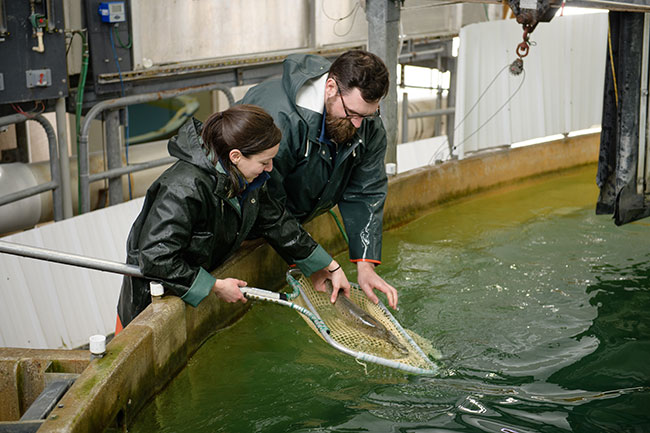
Features
Management
Fresh Tips: Navigating mental hazards at work
March 27, 2024 By Curtis Crouse, Freshwater Institute And Laura Smith Crouse, Certified Clinical Social Worker
 RAS workers must consider both their physical and mental safety.
Photo: Freshwater Institute
RAS workers must consider both their physical and mental safety.
Photo: Freshwater Institute The hazards in a RAS workplace can range from slips and falls, toxic gas inhalation, chemical exposure, disease, and drowning. Recent occupational health studies have begun to characterize the risks aquaculture and RAS-specific workers face. These studies report the expected physical injuries but also point to potential mental health risks for workers employed in aquaculture.
The U.S. Centers for Disease Control and Prevention has reported significantly higher suicide rates for the agriculture, forestry, fishing, and hunting industry groupings.
The RAS workplace can be fast-paced and physically demanding. There will always be pressure to meet production goals in an industry with tight profit margins. When critical infrastructure demands attention, operators can be pulled away from their scheduled daily tasks. Over time, this can lead to feelings that employees lack autonomy and control over their day, which can lead to burnout.
As the RAS industry continues to grow and risks become better defined, employers and staff can also take action on their own to protect their mental health by implementing the strategies discussed in this article.
Fostering community
Research shows that strong relationships have a positive impact on mental health. Conversely, social isolation is a key component of depression. Simple actions such as designating a break room, eating lunch together with coworkers, investing in relationships with colleagues, and deepening connections with friends and family all benefit overall mental health. Routine interaction may also provide more opportunity to recognize if coworkers are exhibiting increased signs of stress or burnout and create space for others to check in with them.
Work/life balance
The workload at a RAS facility can, at times, require long or odd hours, and operators are always one emergency phone call away from having their evening or weekend plans interrupted.
A first step to good work/life balance is being intentional about the transition from work to home. A ritual as simple as a few deep breaths before opening the door can help you leave the workday behind and remain present in your home life.
Operators may need to be reached for an emergency call but could turn off email and other related phone notifications during off-work hours.
Employers should encourage employees to use their earned vacation time to keep productivity high. This can be accomplished by reminding employees to use their time and by making sure that the facility is adequately staffed so that the work can be completed while others are away. Individuals should strive to actively use their time away from work on hobbies and interests to create a more fulfilling work/life balance.
Self-care
There is a link between prioritizing physical health and better mental well-being.
Exercise is a great way to improve physical health and reduce stress. Even though many RAS workers may already spend several hours a day on their feet, staying active outside of work (ideally outdoors on a sunny day) can have mental health benefits.
Getting adequate sleep is another way to take care of your overall health. Establishing good sleep hygiene can ensure a restful night and help to reclaim some of the control lost on an especially hectic day at the farm.
Limiting substances such as alcohol, caffeine, and smoking is another way to feel more refreshed and optimize sleep and well-being.
Workers at RAS facilities should be mindful of their own mental health status and observant of the wellness of those around them. In an industry starved of a trained workforce, RAS employers should consider initiatives aimed at employee wellness and retention.
Implementing the strategies discussed can help manage mental health risks but these are not a substitute for professional help. Symptoms such as increased agitation, loss of interest in hobbies, changes in sleep patterns or appetite, fatigue, social withdrawal, feelings of hopelessness or helplessness, decreased feelings of self-worth, or thoughts of self-harm or suicide could indicate worsening depression.
If you or someone you know are experiencing these symptoms, consider seeking professional help.
Print this page